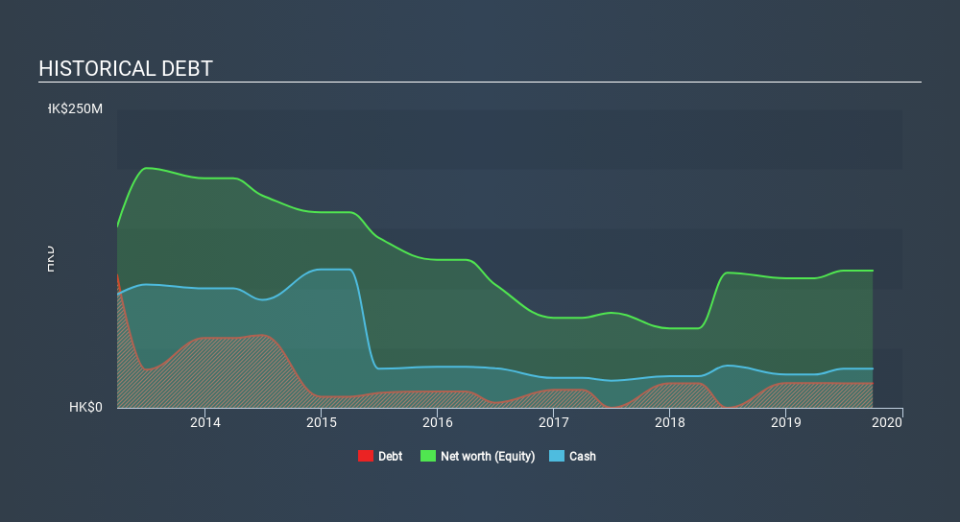Is Yu Tak International Holdings (HKG:8048) Weighed On By Its Debt Load?

Legendary fund manager Li Lu (who Charlie Munger backed) once said, 'The biggest investment risk is not the volatility of prices, but whether you will suffer a permanent loss of capital. So it might be obvious that you need to consider debt, when you think about how risky any given stock is, because too much debt can sink a company. Importantly, Yu Tak International Holdings Limited (HKG:8048) does carry debt. But is this debt a concern to shareholders?
When Is Debt A Problem?
Debt assists a business until the business has trouble paying it off, either with new capital or with free cash flow. Part and parcel of capitalism is the process of 'creative destruction' where failed businesses are mercilessly liquidated by their bankers. However, a more frequent (but still costly) occurrence is where a company must issue shares at bargain-basement prices, permanently diluting shareholders, just to shore up its balance sheet. Of course, plenty of companies use debt to fund growth, without any negative consequences. The first step when considering a company's debt levels is to consider its cash and debt together.
View our latest analysis for Yu Tak International Holdings
What Is Yu Tak International Holdings's Debt?
You can click the graphic below for the historical numbers, but it shows that as of June 2019 Yu Tak International Holdings had HK$20.6m of debt, an increase on none, over one year. However, it does have HK$32.8m in cash offsetting this, leading to net cash of HK$12.3m.
How Healthy Is Yu Tak International Holdings's Balance Sheet?
Zooming in on the latest balance sheet data, we can see that Yu Tak International Holdings had liabilities of HK$38.5m due within 12 months and no liabilities due beyond that. On the other hand, it had cash of HK$32.8m and HK$40.7m worth of receivables due within a year. So it actually has HK$35.1m more liquid assets than total liabilities.
This surplus suggests that Yu Tak International Holdings is using debt in a way that is appears to be both safe and conservative. Because it has plenty of assets, it is unlikely to have trouble with its lenders. Simply put, the fact that Yu Tak International Holdings has more cash than debt is arguably a good indication that it can manage its debt safely. There's no doubt that we learn most about debt from the balance sheet. But it is Yu Tak International Holdings's earnings that will influence how the balance sheet holds up in the future. So when considering debt, it's definitely worth looking at the earnings trend. Click here for an interactive snapshot.
Over 12 months, Yu Tak International Holdings made a loss at the EBIT level, and saw its revenue drop to HK$101m, which is a fall of 7.2%. That's not what we would hope to see.
So How Risky Is Yu Tak International Holdings?
Statistically speaking companies that lose money are riskier than those that make money. And we do note that Yu Tak International Holdings had negative earnings before interest and tax (EBIT), over the last year. And over the same period it saw negative free cash outflow of HK$17m and booked a HK$20m accounting loss. But at least it has HK$12.3m on the balance sheet to spend on growth, near-term. Even though its balance sheet seems sufficiently liquid, debt always makes us a little nervous if a company doesn't produce free cash flow regularly. There's no doubt that we learn most about debt from the balance sheet. But ultimately, every company can contain risks that exist outside of the balance sheet. Consider for instance, the ever-present spectre of investment risk. We've identified 3 warning signs with Yu Tak International Holdings , and understanding them should be part of your investment process.
If, after all that, you're more interested in a fast growing company with a rock-solid balance sheet, then check out our list of net cash growth stocks without delay.
If you spot an error that warrants correction, please contact the editor at editorial-team@simplywallst.com. This article by Simply Wall St is general in nature. It does not constitute a recommendation to buy or sell any stock, and does not take account of your objectives, or your financial situation. Simply Wall St has no position in the stocks mentioned.
We aim to bring you long-term focused research analysis driven by fundamental data. Note that our analysis may not factor in the latest price-sensitive company announcements or qualitative material. Thank you for reading.

